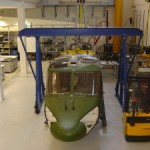
Helicopter in Dynamics Labs
UoB Press release issued 12 September 2012
The performance of engineering structures is controlled by how well they behave in their working environment. In many cases, such as wind or wave power generation, medical robotics, aerospace and large civil structures, nonlinear dynamic effects have a big influence on the operational performance. However, understanding and exploiting nonlinear effects in structural dynamics presents serious difficulties and is acting as a bottleneck in the design progress of many structures.
A collaborative research team led by the University of Bristol has been awarded a grant to create new nonlinear dynamic design tools for engineering structures.
The team from the Universities of Bristol, Cambridge, Sheffield, Southampton and Swansea have been awarded a £4.2 million programme grant by the EPSRC. The aim of the project is to create a step change in the understanding and exploitation of nonlinearity in structural dynamic systems.
The team intends to develop novel modelling and control techniques that can be used directly in the design processes for structural systems and which the group will demonstrate on a series of industry based experimental demonstrators. These design tools will enable a transformation in the performance of engineering structural systems which are under increasing demands from technological, economic and environmental pressures.
The research team will be led by David Wagg, Professor of Structural Dynamics in the Department of Mechanical Engineering at the University of Bristol, and supported by partners including: